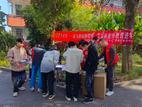During the Spring Festival of this year, the staff of "Charity Home" delivered meals every night to homeless people, who could feel the warmth in this family reunion festival. On Chinese New Year's Eve, they rushed to send meals to vagrants in many places until the early hours of the morning.
"On Spring Festival Eve, there were no pedestrians on the road, but these vagabonds," said a Christian woman surnamed Wang, the founder of "Charity Home" which provides food and accommodation for homeless people.
One day in the first lunar month, Wang cooked fried green vegetables with fungus, scrambled eggs with lettuce, and braised fish pieces. The rice was cooked in a 13-liter rice cooker (enough for 15-20 people). "Last time someone said that he hadn't eaten vegetable rice soup for more than ten years." So she put the rice, water, salt, and greens into the porridge pot, making vegetable porridge.
When the porridge was ready, putting the porridge pot into her handbag, Wang took three of us to the underground passage of the railway station at 7 o'clock in the evening.
Through the crowd, she headed for the taxi lane. As on both sides of the passage, there were more than a dozen homeless people.
While we served them food, Wang exhorted them to believe in God and also invited them to the "Charity Home", telling them the address and how to take the bus or the subway.
"Maybe someone has found a job, as there are fewer people today, which is a good thing. Let's go to the next place." Later, she took us by subway to the city’s most prosperous commercial street. She said that these people were scattered in different places during the day, and gathered there to sleep at night, as it was a warm place.
More than ten years ago, Wang and other church staff began to care for the homeless. At that time, she had become a Christian for just one or two years. One day, she was shocked to hear that some tramps starved to death in the urban area, so she began to bring porridge, steamed buns, bedding, and clothing for them.
Apart from providing supplies, they also invited vagrants to their "Charity Home" to have meals, bathe, and share their life experiences.
Due to economic pressure, they had to replace the rented house of 160 square meters (0.040 acres) near the prosperous area where tramps gathered with a house of 60 or 70 square meters (0.0148 or 0.017 acres) one or two kilometers away. The ministry was once suspended because of disagreements between the core staff.
Although it is difficult, the ministry is fruitful. She said that with their help, some people found jobs, some were admitted to nursing homes in their hometowns, some believed in Jesus with better physical and mental health...
On the way home after delivering the meal, we met another young vagrant. From his story, we could feel the pain of this group.
"Hello, do you know me?" said Wang. "I remember you," The boy stopped and said softly.
"Have you eaten supper? Do you still want to eat?", she asked. "Yes, no more," he replied.
"Eat other people's leftovers and drink the water they have thrown away," The young man said naturally. "I'd rather pick up the leftovers than ask others for help, as some may think why a young man with hands and feet receives giving from others."
The man said he was suffering from epilepsy and could not work properly. Once, he was duped into doing manual labor for a few days, resulting in an epileptic seizure, and was released without payment.
He continued, "I have decided to pick up scraps when the warm spring comes, as this work is freedom and has no pressure."
"I couldn't help crying when I saw what had happened to these poor people. I have seen some waiting at KFC and then grabbing the leftovers as soon as others left," one male Christian who participated in the service said helplessly.
Wang also hopes to have a nursing home founded by Christians, because she has found in her service that some elderly people have pensions but no homes of their own. If this problem cannot be solved, some of them will also become vagabonds, which has already happened.
- Translated by Abigail Wu












